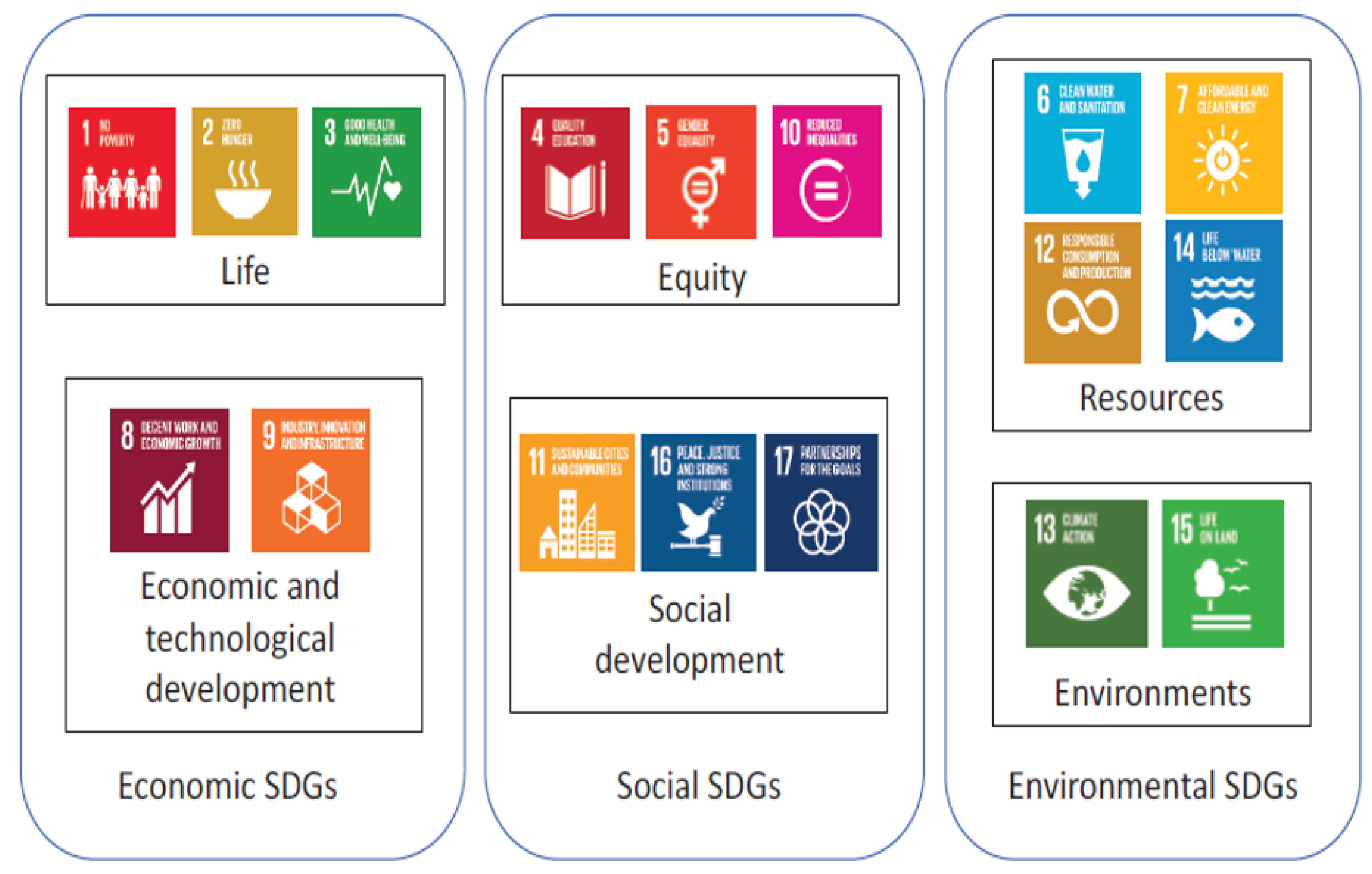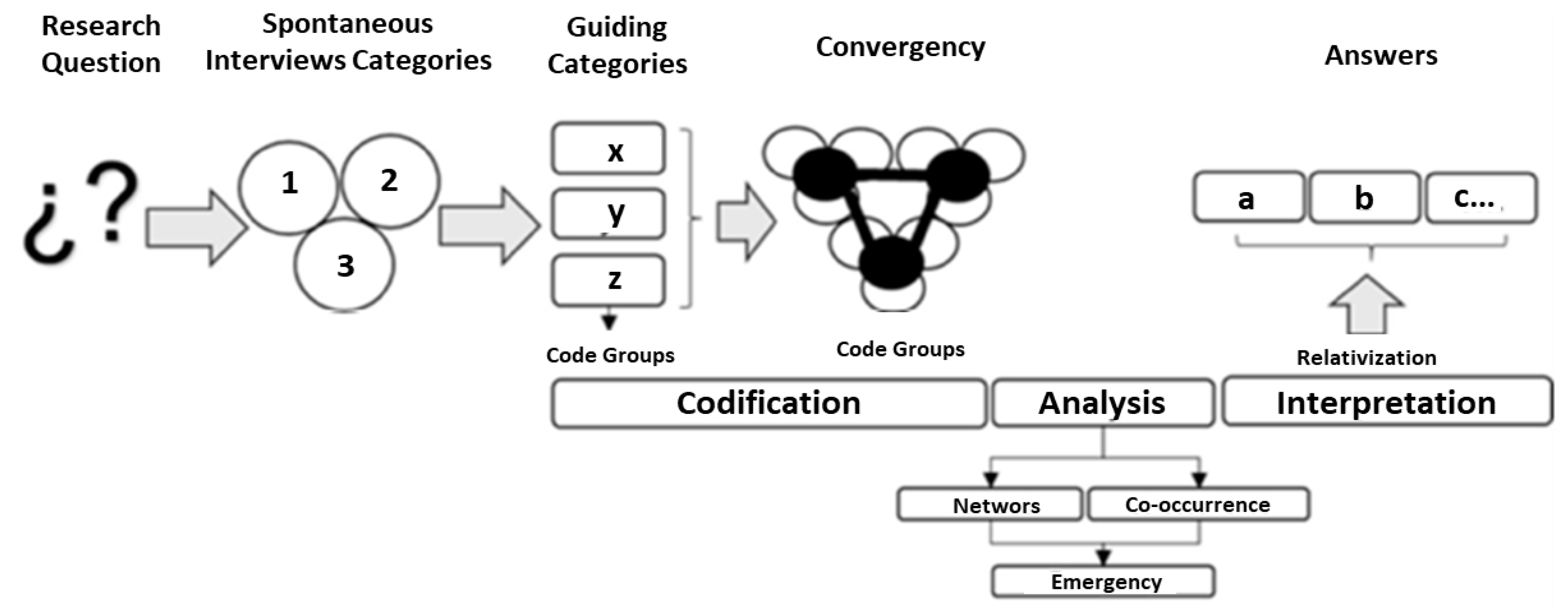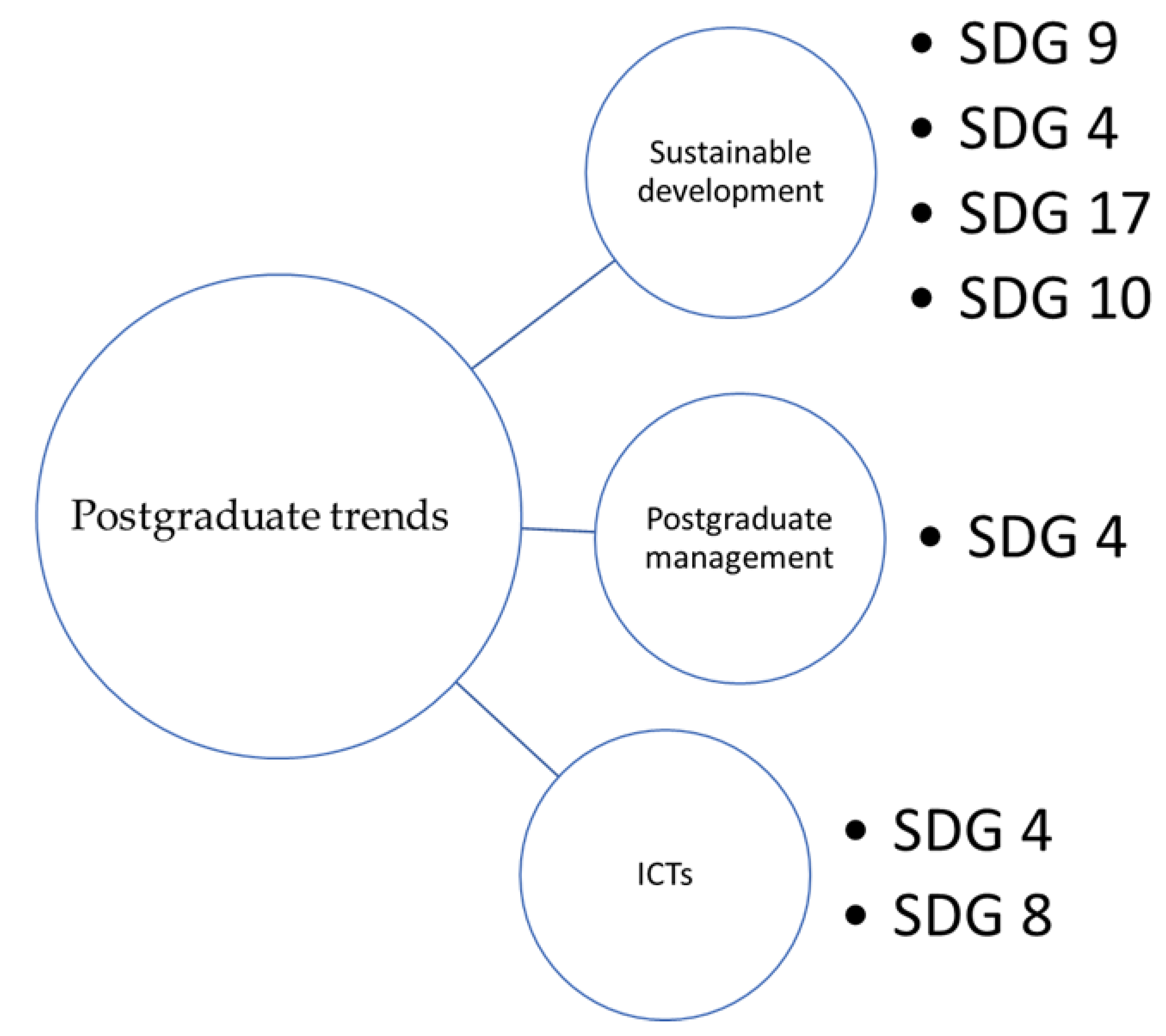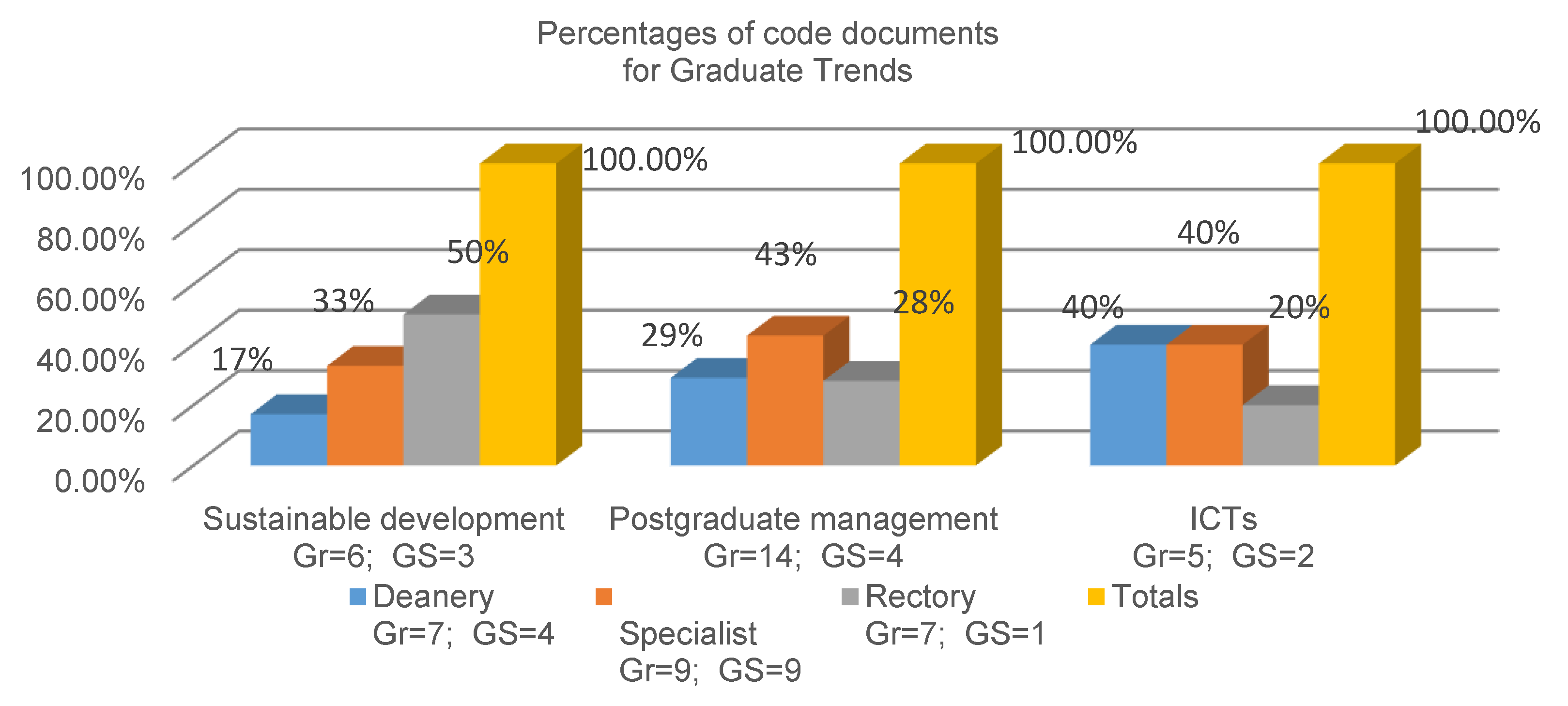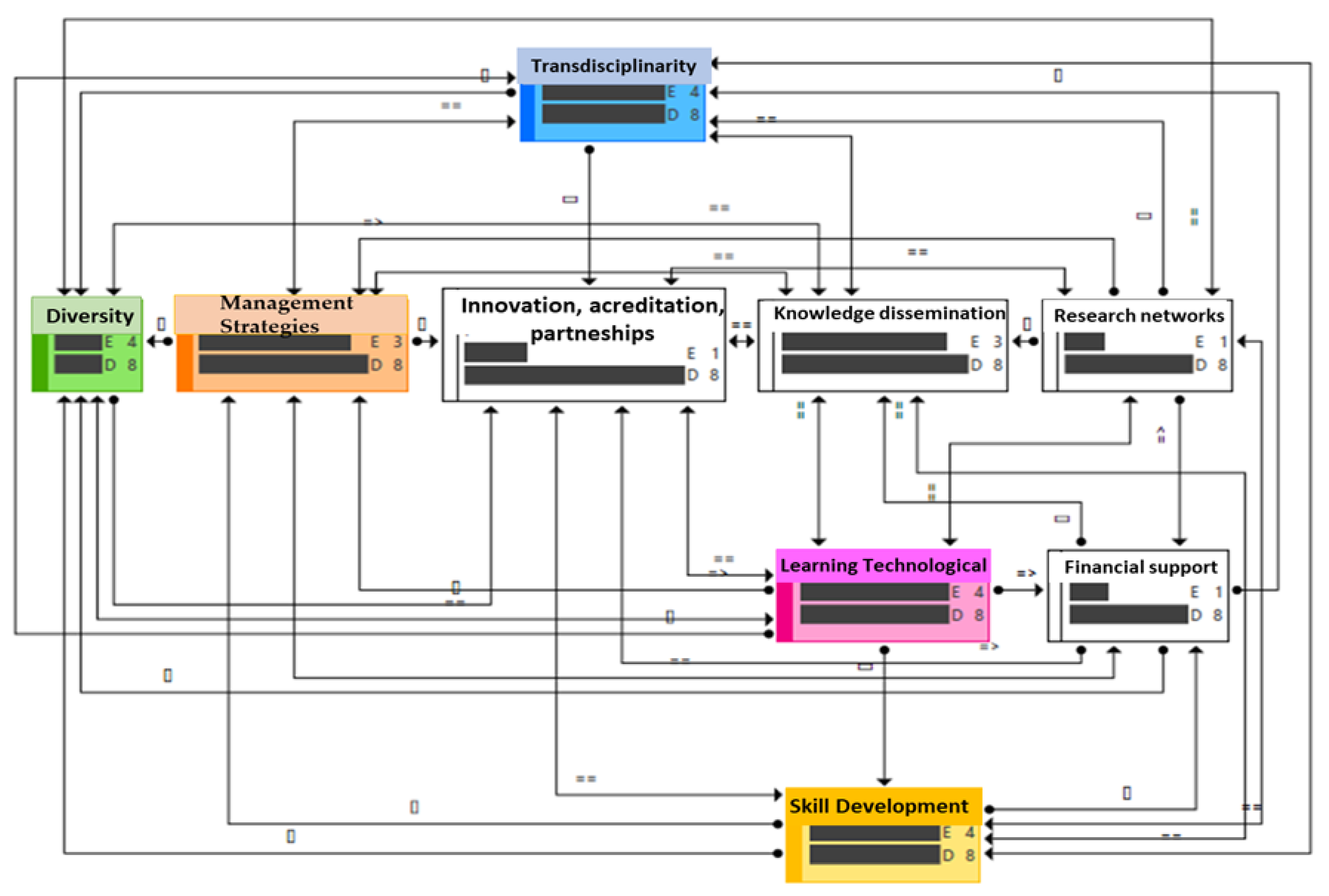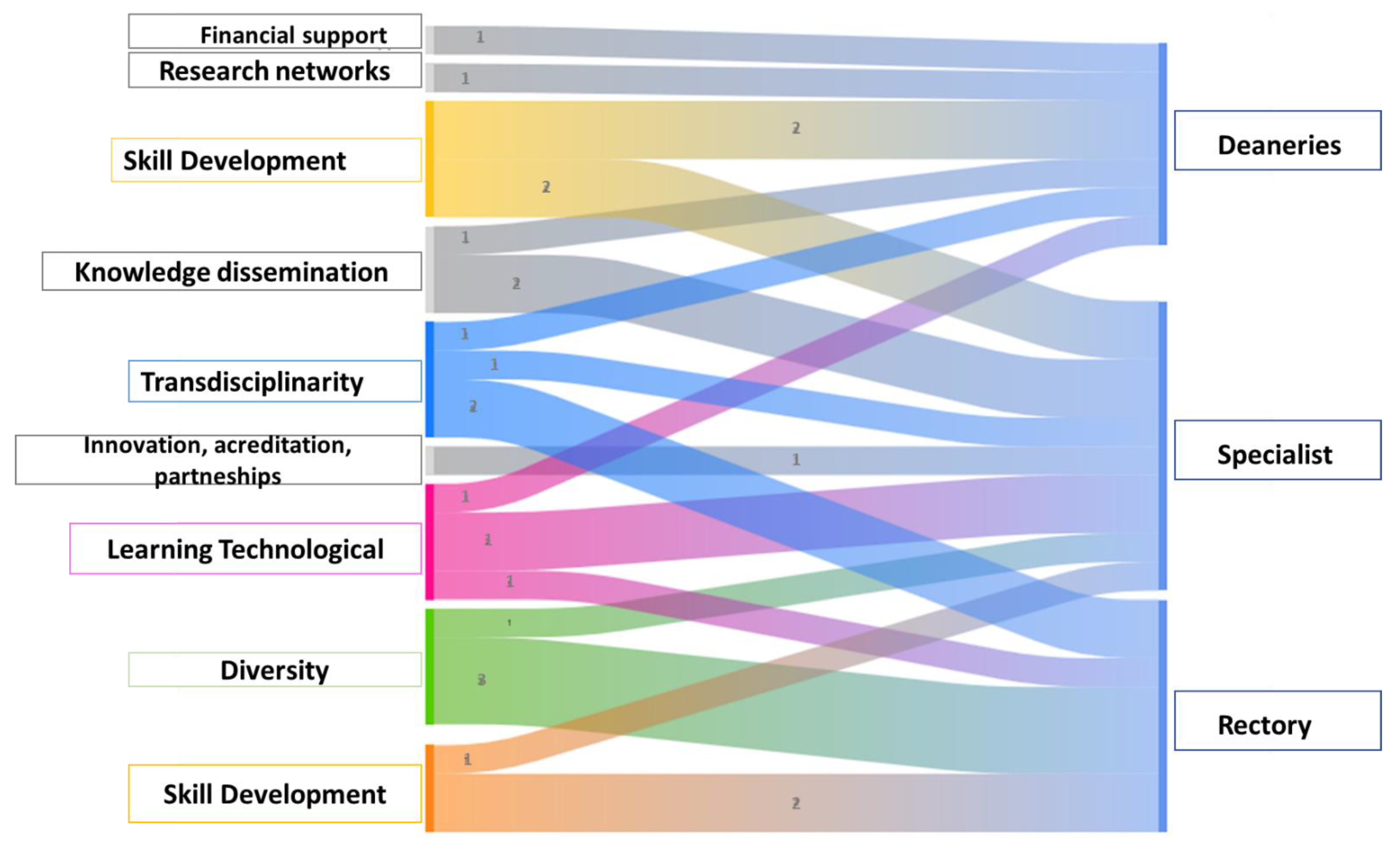Abstract
A sustainable university must educate its academic collaborators and its interest groups, focusing on the key dimensions, such as economic growth, respect for the environment and carrying out energy saving measures, and efficiency and reuse of resources. The aim of this research is to show the tendencies of postgraduate courses in the training of human talent for “Sustainable Development” based on grounded theory. The methodology is approached from the qualitative naturalistic perspective, where the hermeneutic analysis procedure is structured in five phases with data from nine countries obtained from 20 interviews conducted in the year 2021. For this, a dialogical intervention has been used through the complementary experiences of rectors, deans and specialists with doctoral degrees who are immersed in postgraduate programmes in Latin American and Spanish universities, safeguarding the identity under ethical criteria. The main findings show that this human capital that forms part of the universities through their postgraduate programmes is currently considering redesigning their educational programmes to contribute to sustainable development, not only academically but also through their educational model. The main evidence shows that today more than ever there is a need for change, a need for a new human resource that responds and aims for a triple balance: environmental, economic and social.
1. Introduction
In recent years, the convergence of variables such as climate change, economic growth, pandemic crises, armed conflicts in various parts of the world and migratory movements have made sustainability a major challenge for current generations [1]. As a consequence of industrialisation processes and the adoption of new lifestyles, there has been an uncontrolled increase in the exploitation of natural resources, leading to environmental conflicts that reflect the inadequate relationship between man and his environment [2].
All of this generates important educational implications, calling for the value of education as a tool with which to promote the necessary change in values, attitudes and procedures with which to respect the planet. In this sense, Education for Sustainable Development emerges as an inclusive and innovative pedagogical proposal that seeks to promote harmonious relations with the environment, focusing on a change in perspective, leading to the modification of behaviour in ways of living, convictions, and priorities [2].
The above points to the fact that sustainable development is based on three outcomes: economic growth, care for the environment and social development, which is equivalent to saying prosperity, planet and people; the vision of the relevance of higher education in terms of its projection towards sustainable development and its ability to respond to the trends, demands and needs of the world is of particular importance [2]. At the beginning of the 20th century, international organisations were responsible for promoting a whole set of proposals aimed at promoting environmentally friendly education, reflecting the international commitment to Education for Sustainable Development [3].
International experience indicates that capacity development, and in particular the training of human talent, is a key element in promoting sustainable development [1,2]. Many higher education institutions have embraced the concept of sustainability as a mechanism for creating shared values in which both business and various stakeholders achieve mutual benefit. Declaring oneself as an educational institution with a sustainable vision is not just a simple discourse that involves choosing certain Sustainable Development Goals (SDGs) but looking from within and taking action to achieve them [3].
The 2030 Agenda for Sustainable Development is the most ambitious benchmark with which to make the SDGs approved by the United Nations General Assembly for the period 2016–2030 a reality, indissolubly linking educational actions with the principles and axes of sustainability. All of this has led to sustainable development having an impact on all fields of knowledge, with the Latin American and European Higher Education Area being the prelude to promoting an education with which to acquire competences aimed at effectively addressing the ecological challenges that surround us in everyday life and professional practice [3,4], accentuating the need to support university education in a new model that allows a cross-cutting approach to sustainability in all university degrees [3,4].
To this end, universities forge knowledge actions towards human talent, becoming a key factor in the promotion of the 2030 strategic agenda through their graduates, based on commitment and the provision of adequate tools and workspaces to obtain positive impacts [4]. In this way, this research presents results that are close to the strategic management of the goals established in the 2030 agenda, starting by linking it to the purpose of sustainability [4,5].
Therefore, today’s universities are striving to inspire confidence and promote change to incorporate sustainability in the academic strategy, the link with the environment, and in the teaching and learning processes [5]. Furthermore, not only in activities that, although positive, are complementary for students at this level, the commitment of the leaders of university organisations shows that it is vital to aim for more social actions with the environment and, therefore, there needs to be coherence between their discourse, their work and their actions [6].
It is important to evidence the coherence of educational leaders (rectors, deans and specialists) with the stated purpose in the management of new actions towards sustainable development in universities and from their programmes [7], both in their development with a vision set on the most difficult and challenging trends, when the solidity of leadership that strengthens a “powerful” culture regarding this issue is tested [8]. Students feel committed and choose to embrace an academic training with content framed towards environmental care, actions from a circular economy among others, which welcomes them when they feel represented and listened to with openness, trust, respect, and transparency, even with naivety [9].
This is why the present study poses the research question: What are considered to be the postgraduate trends that should be implemented in the training of human talent for sustainable development? In this way, the purpose of the research is to show the trends that exist in postgraduate programmes for the training of human talent in sustainable development from the perspective of university rectors, deans and specialists. As mentioned above, the issue of education for sustainability is one of the greatest challenges facing the academic world from a holistic training perspective [7].
For this reason, the paper is structured as follows: after the introduction, a review of the literature framing the study and the purpose of the paper is presented, explaining grounded theory as a method to establish the importance of theoretical constructs derived from the contexts, and therefore, from the problems or areas of interest delimited to that context. This is followed by a discussion of the results that demonstrate the importance of promoting education for sustainability and, finally, the discussion together with the con-clusions of the study.
2. Theory Review
2.1. Human Talent Being Trained for the Changes Aimed at Sustainable Development
To achieve sustainable development, it is essential to harmonize three basic elements: economic growth, social inclusion and environmental protection. These elements are interrelated and are all essential for the well-being of individuals and societies [6,7]. The introductory texts of the Sustainable Development Goals extracted from the United Nations website announce the goals of each Goal that correspond to those included in resolution 70/1 of the General Assembly, entitled: “Transforming our world: the 2030 Agenda for Development Sustainable” [7]. These frame the global indicators that have been extracted from the official document of the United Nations, in the “Framework of global indicators for the Sustainable Development Goals and targets of the 2030 Agenda for Sustainable Development” [8]. As a result of these studies, a greater interest and awareness has been observed in young students in training aimed at sustainability, who were concerned that everything that is developed today is in good condition and with favorable conditions for future generations (See Figure 1).
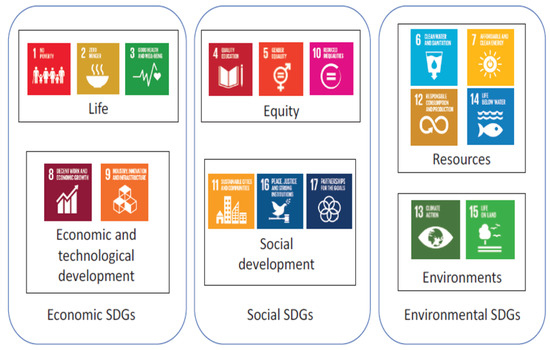
Figure 1.
Source: Sustainable Development from the perspectives of three dimensions [14].
In this way, universities constitute a privileged setting in which to design pedagogical proposals with which to implement training of human talents for Sustainable Development, considering that the students who are in training will in the future occupy professional positions in different labor scenarios, constituting an engine of change to respond to new environmental challenges. From this perspective, the bet is to integrate sustainability into the strategic objectives of universities [3,4,5,6,7]. This implies the adoption of changes in the way of conceiving the curriculum and traditional teaching methods, incorporating the central elements of equity and social justice in the various professions, to work from responsibility and ethics towards sustainable development.
The 2030 Agenda thus represents a multilateral consensus between governments, institutions and various actors, capable of reconciling national policies in favor of employment with rights and development with the expansion of international trade and conflict prevention [1,2,3,4,5,6,7]. These actors are projected through a human talent in training for changes aimed at sustainable development, it is a concept that today concerns many entities both in the public and private sectors when it refers to changes aimed at economic, social and environmental well-being, since they are the cornerstone to achieve the established objectives [9,10].
For an adequate approach to understand what the concept of “Human talent training” implies in organizations that aim at sustainable development, we can start from the simplistic definition of “talent” found in the postulates such as: “intelligence, intellectual property capacity of a person” [11,12]. It is also established by other authors as “aptitude or capacity for the exercise of a trade” or “intellectual gifts that give value to an individual” [13,14].
The foregoing establishes human talent as the set of these values that constitute what is traditionally known as the human capital of an organization, and it should be added that it is not just about talent, it is also about the development of managerial leadership in the people of the organization. Organization, and this is based on the trust they arouse, in addition to their talent, their capacity for innovation and their ability to solve complex problems, all accompanied by the ethical coherence that others perceive” [15].
In this sense, and in trying to give a significant sample of the dimension to the concept, it is not only currently defined as a simple incremental improvement in the occupational qualification of individuals, but also as a demanding process of knowledge accumulation (knowledge management and organizational learning), as expressed in the current notion of human talent competencies [16,17].
However, for sustainable development, it should be noted that this notion has gained a lot of ground in economic, social and even academic discourses, assuming perhaps without much foresight, due to its excessive materialization, the reification of the human [18]. Many organizations have adopted the concept of sustainability as a mechanism to create shared values with their people, in which both the company and the various stakeholders achieve mutual benefit.
During the last decade, the interest of the scientific community in reviewing the conceptual bases of the training of human talent for Sustainable Development has been growing, with profuse research focusing on assessing the effects of its implementation on the collective students and faculty of all educational stages, including university [14]. In the same way, in the scientific literature there have been publications that analyze, from a bibliometric perspective, the number of recent investigations related to this discipline in the context of education of human talent that significantly point to 4.7 of SDG 4 [5], although it has been observed that there are few studies that analyze the scientific production of an education linked to the paradigm of sustainability in the university context.
In this sense, declaring oneself a sustainable educational institution is not a simple speech that implies choosing some Sustainable Development Goals (SDGs), but looking from within and taking measures to achieve them, and it is from this information that the concept of human talent arises. This does more justice at the level of the human being, since it implies human development, in addition to everything related to the productivity and competitiveness of organizations, an aspect that is analyzed below from the perspective of the three dimensions (Economic, Social and Environmental [14,15,16,17,18,19].
The foregoing highlights that the human talent trained from the vision of the 2030 Agenda could be the result of the broadest and most participatory consultation process in the history of the United Nations, and it would represent the emerging multilateral consensus between governments and diverse actors, such as civil society, the private sector, and academia [20,21]. Likewise, the normative bases of this multilateral agenda start from the charter of the United Nations of 1945 to the more than 40 references of the UN conferences and conventions approved to date.
To this end, human talent has become a key factor in promoting the sustainable agenda of each organization, based on commitment and the provision of adequate tools and workspaces to achieve positive impacts [22]. This begins by linking it with the purpose of actions in the sectors that point to the needs aimed at improving preventively and as a priority [23].
Unfortunately, 2020 also brought with it a global pandemic that would disrupt the lives of most of the planet’s inhabitants; the coronavirus complicated everything much more and put vulnerability on the table for the concept of globalization [24]. Another great enemy of the paradigm shift is the lack of risk management. We are not able to manage risks early enough to be resilient and able to deal with whatever comes our way.
Meanwhile, the problems and challenges that lie in wait for the planet have led the curricula of basic, secondary, and higher education establishments to reprogram their contents to incorporate them. Environmental education is part of a transformative process based on knowledge, values, and attitudes that allows for the construction of a fair, sustainable, and regenerative society, where children and young people are responsible for the rational use of resources, thus achieving an adequate use of those resources and sustainable development that contributes to solving the environmental problems that we face in the world [25].
All this context has led to the care of natural, environmental, and human resources being placed on the agenda of governments, companies, and institutions at a non-privileged level. This paradigm shift requires a capitalism capable of fulfilling a triple objective: environmental, social and good governance. Additionally, this will be the key to recovery; what the authors have called the three R’s: regenerate, rebuild and restore [25,26].
2.2. Postgraduate Trends for Training Human Talent in Sustainable Development
Student retention and achievement is a global phenomenon facing higher education that dates back to the 1960s and remains a critical concern around the world today [27]. At this time, the university educational system must actively contribute to society in the direction of sustainable development, while striving for ecological viability and social justice [28].
For example, university educational institutions must be sustainable in order to set a good example for young people in a sustained manner [29]. The trends go back to aspects of strategic management processes and elements of human diversity that come together in an educational organization such as sustainable development, diversity in innovation, accreditation and partnerships, and financial support [30].
University education currently faces important challenges that must be mediated through postgraduate programs for sustainable development [28]. It requires promoting the generation of critical knowledge and the training of people who incorporate an ethical and global perspective in the exercise of their future profession, while becoming part of an active citizenry committed to sustainable development [14]. In this sense, sustainable universities must educate their students to respect the environment and carry out energy saving measures, reuse and efficiency of resources and buildings, and encourage recycling.
The well-established approach of Education for Sustainable Development (ESD) empowers students to make informed decisions and act responsibly for environmental integrity, economic viability and a just society for present and future generations [3]. Educating for sustainable development is incorporating into educational systems the fundamental issues of sustainable development such as climate change, disaster risk reduction, biodiversity, poverty reduction and sustainable consumption, while enabling human beings to acquire the knowledge for the future.
This means that efforts must be made to make the academic functioning and design of classes in graduate programs more sustainable through these categories [31]. At the same time, education and training work must be based on the concept of sustainability and try to reconcile theory, “teaching”, with practice, “academic, school and professional life” [31].
In addition, the attitudes of postgraduate students must be influenced not only by the specific lessons of each subject or thematic axis seen in the program, but also by what they experience and observe every day in their professional environment. This is helped by postgraduate courses in development of managerial skills, dissemination of knowledge, management strategies and transdisciplinarity [4,5,6,7,8,9,10,11,12,13,14,15,16,17,18,19,20,21,22,23,24,25,26,27,28,29,30,31,32].
Therefore, to fulfill this mission in a credible manner, university institutions must strive to address their own deficits in the plans that realize the Goal 4 (SDG) goals, through actions that promote Goal 4.7 mentioned above, so that knowledge and action are at the same level [33].
In this way, in education and with it professionals and students frequently face trends in innovation intentions and therefore it is important that each new proposal to generate change is subject to ICTs Learning, Technology, Research Networks that is justified and focused on the needs of those involved and of society, in collaboration with those who command and promote sustainable innovation. According to [11,12,13,14,15,16,17,18,19,20,21,22,23,24,25,26,27,28,29,30,31,32,33,34,35], starting from the above, every educational system with a sustainable vision tends to be multifunctional, and there are at least “four functions” among them:
- -
- Socialization;
- -
- Respect for culture and citizenship;
- -
- Vocational;
- -
- Liberal.
Therefore, postgraduate studies should position themselves in the first two functions by promoting instrumental values and skills focused on Sustainable Development [36]. On the other hand, the instrumental vision of sustainable education emphasizes the purpose and the product of postgraduate management, which is related to the question “what is education for?” rather than to the nature of education itself [20,21,22,23,24,25,26,27,28,29,30,31,32,33]. As for the liberal and human vision of education, it tends to emphasize ICTs, which have more to do with the processes and quality of the teaching–learning experience from the technological era we are going through.
Finally, trends in talent training programs for sustainable development should incorporate all four functions, but above all be based on the last two, liberal and professional [15,16,17,18,19,20,21,22,23,24,25,26,27,28,29,30,31,32,33,34,35,36,37]. It is about integrating and balancing the processes with a purpose, in a way that is informative and, at the same time, promotes creative and participatory learning to act in context in solving socio-environmental problems [38]. Therefore, this type of action in sustainable education would allow individuals to use and expand their potentials, develop their skills, improve their living conditions, and increase their earning potential [33,34,35,36,37,38,39].
3. Materials and Methods
The present study has a qualitative approach. The qualitative research methodology recognizes the human being as a producer of knowledge, to understand reality through the construction of “meanings” rescuing the heterogeneity of society [40] (See Figure 2). Its methodological structure is not linear or previous; it arises in the development of the study through an inductive process reconstructing the realities of the subjects investigated from their natural environment. For this study, the phenomenology and fundamental theory of Heidegger and Strauss traces an argumentative axis towards the defense of the specific character of human reality against the challenges of sustainability that makes it irreducible to the categories of analysis of physical reality whose essence are the objects or material things. This research was carried out for the application of the in-depth interview technique, and as an instrument, a semi-structured questionnaire and this qualitative study with a naturalistic approach was structured following the procedure of González-Díaz, Acevedo-Duque, Gaunilo-Gómez and Cruz-Ayala [41], who configured the hermeneutic analysis in five phases (see Figure 2 and Table 1).
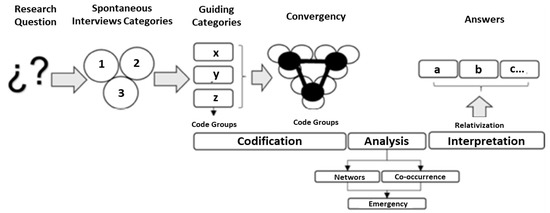
Figure 2.
Hermeneutic analysis in 5 phases of González-Díaz et al. (2021) [41].

Table 1.
Hermeneutic analysis in 5 phases.
4. Results
This section presents the results of the interpretative hermeneutic analysis of the interviews conducted with key subjects from different universities in Latin America and Europe. This provides evidence of the significant findings of the research results. On the trends that exist in the training of talent, there is a set of initiatives that are adopted in a university institution with the intention of promoting professional growth for sustainable development (Ver Figure 3).
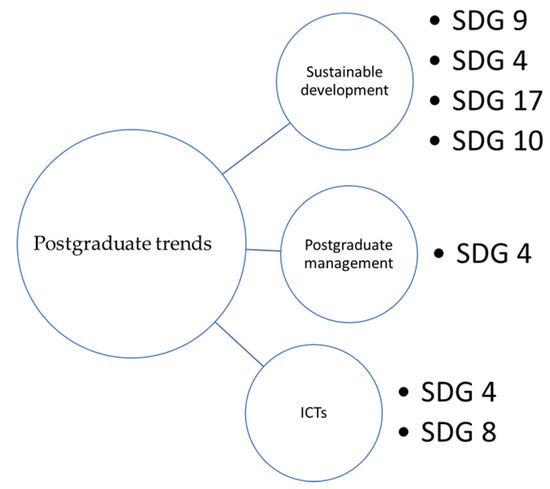
Figure 3.
Model sizing Indicative categories.
Table 2 shows the logical order obtained from the key informants through the answer to the research question and is used to evidence the five-phase hermeneutic analysis proposed by González-Díaz et al. (2021) [41]. This section evidences the findings in three approaches (Sustainable Development, Postgraduate Management and Information and Communication Technologies), which respond to the objective of the investigation through coding groups that seek to detect the factors that intervened in this investigation (See Table 2).

Table 2.
Distribution of unit of analysis.
4.1. Key Informant Responses
We live in a competitive world, where the experience and skills required for a position are increasingly important when recruiting staff; however, despite the changing world of work, postgraduate studies are still one of the credentials required in job selection processes aimed at training with a sustainable vision. For the purposes of this research, some of the speeches of the rectors, deans and specialists who participated in the research will be mentioned and, for ethical reasons, were coded under research criteria. Rectors (R), Specialists (S) and Deans (D.O) (See Figure 4).
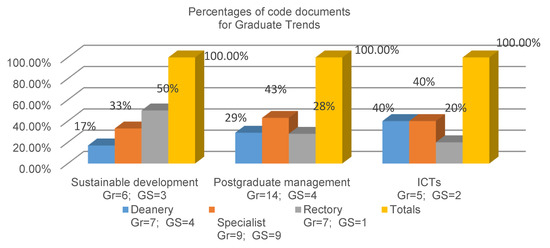
Figure 4.
Percentage code document for postgraduate trends for sustainable development.
4.1.1. Rectorship (Training in Sustainable Development for Talent and Training)
The rectors highlight major trends from sustainable development such as:
“This year’s trends point to attendance in face-to-face and virtual classes, which is a cause of detection of human talent to continue their training, but it is also necessary to address training needs, and it is part of specialisation that aims at sustainable development.”R-1
“The detection of human talent is a cause of specialisation and training needs aimed at sustainable development, the creation of research commitments is the cause of sustainable development and leads to the improvement of research programmes, it is also part of humanistic and applied research.”R-5
“The use of new technologies is a reason for being competitive in the market and is associated with the policies and values of the organisation”R-4
4.1.2. Specialists (Research and Management of Sustainable Programmes)
Sustainable research and programme management as a guiding category is more rooted in the creation of research commitments and programme improvement; however, specialists also emphasise the importance of sustainable development, as well as applied and humanistic research.
“The creation of research commitments is a cause of sustainable development on the part of students and teaching staff and is part of both applied and humanistic research, and is also a causal factor in the improvement of research programmes”.S-1
4.1.3. Dean’s Offices (Programmes Oriented towards Sustainable Development from ICT)
The dean’s offices showed high perspectives regarding the development of talent and training as a guiding category from ICT, where the greatest emphasis is placed on technological learning and the detection of training needs for human talent.
“The updating of human talent is a cause that develops students’ interest in new technology, to take face-to-face and virtual classes, is part of the specialisation and is associated with the training needs for the future”.D.O.1.
“The assistance aa aiming at transdisciplinarity in face-to-face and virtual classes is a cause that allows the detection of human talent and generates training and specialisation needs”D.O.5.
“Competence development is part of teacher training needs for sustainable development”D.O.4.
“Diversity and motivation is a driver for training needs.”D.O.3.
“The detection of human talent is associated with teacher updating, leadership and motivation and teacher education needs, and is a cause of specialisation”D.O.2.
4.2. Postgraduate Trend Results
The categories presented show the different values, alternatives and the way to classify, conceptualize or codify the terms or expression in a clear way, avoiding that it does not lend itself to confusion for the purposes of a certain investigation [41]. This article makes a conceptual review based on different contributions that deal with the subject in order to specify and provide specific guidelines that direct the purpose of this research through what was mentioned by the key informants.
Figure 4 details the three guiding categories that refer to postgraduate trends where the informants reflect the percentage of importance they give to each category through the number of citations, such that:
- -
- For Sustainable Development (SD), 17% belongs to dean’s offices, 33% to specialists and 50% to rector’s office.
- -
- For Sustainable Graduate Management (GPS), 29% belongs to the deans’ offices, 43% to specialists and 28% to the rector’s office.
- -
- Finally, for Information and Communication Technologies (ICTs), 80% is for the dean’s offices and specialists and 20% for the rector’s office (See Figure 4).
The semantic network serves as the basis for the construction of mental and conceptual maps. It is a diagram that is used to represent ideas, drawings, tasks, and words, among other types of concepts, that are related to each other [41,42,43]. For the purpose of this investigation, the frequencies of emerging codes that allowed obtaining significant results were detailed.
Through the semantic network, Figure 5, the open codes are related between each informant, so that for the deanships, specialists and rectory, the high expectations were focused with greater emphasis on aspects such as Skills Development (DS), Technological Learning (TL), Transdisciplinarity (T), Diversity (D) and Management Strategies (M) (See Figure 5).
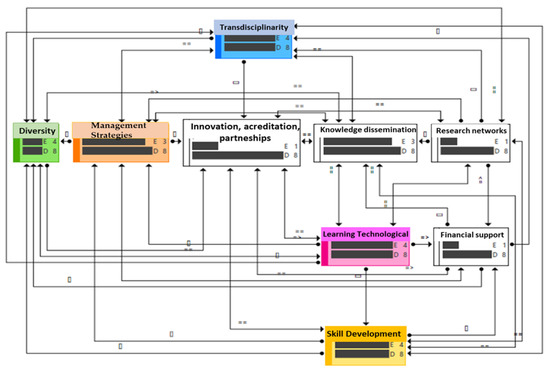
Figure 5.
Semantic network of the category postgraduate trends. Own elaboration, 2022.
The coding of data in the present investigation consisted of the process in which the categories of the data to be addressed are defined. Generally, this process was obtained to carry out the data analysis after the interview with the key informants through the Atlas.Ti9 software for qualitative data analysis [41].
The results evidenced the frequency of the emerging codes, represented by the width of the lines in Figure 4, highlighting the trend towards postgraduate management, in order of importance, towards Skills Development (SD), Technological Learning Learning (TL), Transdisciplinarity (T), Diversity (D), Management Strategies (MS) and, finally, Skills Development (SD) (See Figure 6).
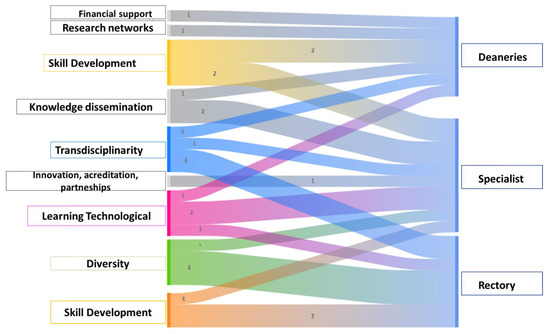
Figure 6.
Emerging codes for postgraduate trends for sustainable development by unit of analysis. Own elaboration, 2022.
The emerging categories for this research are the different values or alternative ways to classify, conceptualize or codify a term or expression in a clear way issued by the key informants in the interview, generating interesting perspectives for the purposes of the present investigation.
Table 3 and Table 4 represents the emerging categories found and their respective percentages for each informant. The absolute value refers to the number of citations for each category and type of informants who expressed an opinion on the topic, indicating the degree of importance for each of them (See Table 3). As you can see:
- -
- For Skills Development (SD), it was 50% for each participant, deanship, and specialist, respectively;
- -
- Regarding Technological Learning (TA), the specialists stood out with 50% and with 25%, in equal percentage, the dean’s office and the rector’s office;
- -
- Regarding Transdisciplinarity (T), with 50% for rectory, 25% in both cases for specialists and deanships;
- -
- In Diversity (D), 75% for rectory and 25% for specialists;
- -
- Finally, Management Strategies (GS) with 66.67% for rectory and 33.33% for specialists.

Table 3.
Guiding categories and groups of codes.
Table 3.
Guiding categories and groups of codes.
| Hermeneutic Approach | Guiding Category | Code Group | Codes that Contribute to the SDGs | Targeted Research |
|---|---|---|---|---|
| Postgraduate trends | Sustainable development | Diversity | SDG 9 SDG 4 | [42] |
| Innovation, accreditation, and partnerships | SDG 10 | [43,44] | ||
| Financial support | SDG 17 | [45,46] | ||
| Postgraduate management | Skills development | SDG 4 | [7,8,9,10,11,12,13,14,15,16,17,18,19,20,21,22,23,24,25,26,27,28,29,30,31,32,33,34,35,36,37,38,39,40,41,42,43,44,45,46,47,48] | |
| Knowledge dissemination Management strategies Transdisciplinarity | [8,9,10,11,12,13,14,15,16,17,18,19,20,21,22,23,24,25,26,27,28,29,30,31,32,33,34,35,36,37,38,39,40,41,42,43,44,45,46,47,48,49,50] | |||
| ICTs | Learning | SDG 4 SDG 8 | [50,51] | |
| Technologic | [45,46,47,48,49,50,51,52] | |||
| Research networks | [45,46,47,48,49,50,51,52,53,54] |
Note: SDG 4 = Quality Education. SDG 8 = Decent Work and Economic Growth. SDG 9 = Industry and Innovation and Infrastructure. SDG 10 = Reducing Inequalities. SDG 17 = Partnerships to achieve the Goals.
The research also yielded some emerging categories, these categories are the different values, alternatives is the way to classify, conceptualise or codify a term or expression in a clear way that does not lend itself to confusion for the purposes of certain research (See Table 4).

Table 4.
Emerging categories.
Table 4.
Emerging categories.
| Deanship Gr = 7; GS = 4 | Specialists Gr = 9; GS = 9 | Rectory Gr = 7; GS = 1 | Totals | |||||
|---|---|---|---|---|---|---|---|---|
| Category Emerging | Absolute | Relative | Absolute | Relative | Absolute | Relative | Absolute | Relative |
| ● HTD | 50.00% | 2 | 50.00% | 0 | 0.00% | 4 | ||
| Gr = 4 | 2 | 100.00% | ||||||
| ● TL | 25.00% | 2 | 50.00% | 1 | 25.00% | 4 | ||
| Gr = 4 | 1 | 100.00% | ||||||
| ● T | 50.00% | 2 | 50.00% | 0 | 0.00% | 4 | ||
| Gr = 4 | 2 | 100.00% | ||||||
| ● D | 0.00% | 1 | 25.00% | 3 | 75.00% | 4 | ||
| Gr = 4 | 0 | 100.00% | ||||||
| ● MS | 0.00% | 1 | 33.33% | 2 | 66.67% | 4 | ||
| Gr = 3 | 0 | 100.00% |
Note: HTD = human talent development, TL = technological learning, T = tranadisciplinarity, D = diversity, MS = management strategies.
5. Discussion
The study undertaken allowed for the extraction of metadata, codes and emerging categories in the existing trends in the training of human talent for sustainable development in the university context. The increase in scientific literature related to this discipline and its impact on higher education in recent years can be explained by the interest it has aroused among the scientific community, as a response to the surrounding environmental problems and the responsibility to be assumed from university education. [7]. However, the concern for 2021 was about policies in health, climate, equity, supply chains, sustainable consumption and other mega trends. However, for quality education, only online, hybrid, or face-to-face education in academic settings were discussed [3]. Now, between 2021 and 2022, studies such as economic growth, diversity and hybrid work were some of the most listened to trends so far this period, promoting actions to resume the agenda in human talent management.
Therefore, training for Sustainable Development (FDS) should be resumed through the educational sector, to contribute to the urgent and dramatic challenges facing the planet [7]. Among the most relevant results of this research, it is worth highlighting the concern of key informants that significant changes and contributions must be made to the training of talent that will face work spaces that point to sustainable development visions.
It is important to comment that these key informants express their concern given the collective activities on the modifications to the Earth’s ecosystems, in such a way that our own survival seems to be in danger due to changes that are increasingly difficult to reverse [8,9,10,11,12]. For authors such as Cheng, C. and Yu, Y. Early [27], they state that in order to stop global warming before it reaches catastrophic levels, environmental, social, and economic issues must be comprehensively addressed. The ESD 2030 Agenda for Education aims to achieve the personal and social transformation necessary to change course [47].
However, authors such as 35. Storey, M.; Kilian, S.; O’Regan, P. [35], establish that the scenarios in which the COVID-19 pandemic has manifested itself has brought great challenges in all professional fields, and the training of human talent does not escape this realization to overcome the uncertainties caused by the pandemic situation. The foregoing affirms what was commented by Zhang, G.; Tang, C.; Qi, Y. [55], Currently, higher education institutions manage a perspective in the formation of human talent, offering the possibility of finding the human being immersed in the organization and working based on him/her, on his/her potential, capacities, feelings and emotions, generating added value and a differentiating aspect in the generation of professionals with a vision of sustainable development.
The results of this research point to interesting categories that highlight the trend of postgraduate management, in order of importance, towards Competency Development (CD) [28], Technological Learning (TL) [29,30,31,32,33,34,35,36,37,38,39,40,41,42,43,44,45,46,47,48,49,50,51,52,53,54,55,56], Transdisciplinarity (T) [30], Diver-sity (D) [31], Management Strategies (MS) [32,33,34,35,36,37,38,39,40,41,42,43,44,45,46,47,48,49,50,51,52,53,54,55,56,57] and, finally, Competence Development (CD) [33]. The new trends in the training of human talent from postgraduate programs in university institutions focus on the development of valuable positions for human talent, in which it can be maintained in a sustainable manner and where its goods and services can be used on a sustained basis [58].
Authors such as Barth, M.; Diosemann, J.; Rieckmann, M.; Stoltenberg, U [33] affirm that the trends in education for sustainable development determine some characteristics of the institutions that work with models of sustainable development, such as: they work by projects, making the student the protagonist and the teacher the facilitator, or, they guide learning towards action, fostering creativity towards caring for the environment, group work, conflict resolution and the search for compromise solutions.
The foregoing is in line with the results issued in this investigation through the main informants, authorities and collaborators, who establish that the trends in the formation of human talent in postgraduate programs should have been framed in the Development of Competences (SD), which was 50% for each participant, deanery and specialist, respectively. Regarding Technological Learning (TLAR), the specialists stood out with 50% and the dean and the rectorate with 25% in equal percentages. Regarding Transdisciplinarity (T), with 50% for the rectorate, 25% in both cases for specialists and deans. Regarding diversity (D), 75% for the rectorate and 25% for specialists; finally, Management Strategies (SG) with 66.67% for the rectorate and 33.33% for the expeditious.
Today, more than ever, there is talk of the need for change. A strategy that feeds back to a triple final result: environmental, economic, and social. To this end, authors such as [22] propose three key trends in sustainable development: green regeneration, social reconstruction and a rethinking of the current concept of capitalism.
6. Conclusions
Education is the ideal tool for building values, skills and knowledge, being the engine of all the changes that could occur at this time, where human talent desperately needs to establish changes towards the sustainable development of resources. Recognizing its role as a catalyst to build a better and more sustainable future for all, the United Nations General Assembly, in its Resolution 57/254 of December 2022, proclaimed that the period 2005–2014 was the Decade of Education for the Sustainable Development, but given both before and after this period, ESD has been and continues to be very present in the programs, conferences and objectives of the United Nations.
The foregoing frames the findings that this research shows in the face of an education lacking sustainable development, as well as the need to incorporate the SDGs into education systems, developing the skills and tools that address the key issues of sustainable development in the formation of the human talent, such as climate change, resource management, risk reduction, biodiversity, poverty reduction and sustainable consumption, where time for future professionals to be allowed to acquire the knowledge, skills, attitudes and values necessary to build a sustainable future is given.
The works on educational research that point to the formation of a human talent with a sustainable development vision show the commitment that managers and teachers must assume in a sustainable education, integrating issues related to planetary degradation in the teaching space of the subjects imparted. In this line, other previous investigations are situated in which the need to have an involved teaching staff is verified, which offers students all those learning experiences with which to develop personally and professionally in the context of sustainability.
The prospective that this research project emits is essential to establish precise lines of research, depending on each region, through institutional policies that involve academic, political, social, economic, and cultural actors and thus renew the contents of the postgraduate programs and promote a greater capacity for innovation. Finally, the conclusions of this research advance the evidence to expand the scarce academic literature, allowing this research to be of interest to other researchers who can expose it with other higher education institutions in different continents, to refine and expand knowledge in this area.
6.1. Transcendence
The present study may have theoretical ideas, since it offers a new intention. The data collected by academic authorities show the need to implement important actions that they have in the formation of human talent for sustainable development. The model and the results of this research show the trends to enhance the generation of critical knowledge and the training of people who incorporate an ethical and global perspective in the exercise of their future profession, while serving in part as a citizenry that is active and committed to sustainable development. At the same time, it shows emerging categories that influence evidencing challenges and proposals in academic training that can acquire the values, attitudes, skills and knowledge that are needed to contribute to sustainable development, enabling students to make informed decisions and take responsible actions, and become agents of change in their educational institutions, communities and societies.
The findings in this research show that education represents the basis of the sustainable development of a nation in its three dimensions: economic, social and environmental. It must be an element that is treated as fundamental as the right to a decent life and individual development, and as a determining factor for the reduction in poverty and inequalities.
6.2. Limitations and Future Research
The present study has some limitations. Firstly, the study was conducted in some universities in the Latin American and European regions, so it can be replicated in other countries. Secondly, the study focused on collecting information from specific key informants (rectors, deans and specialists), projecting the need to apply them to undergraduate, postgraduate and doctoral students. Third, the sample size was small and selected given the existing networks and agreements between the collaborators of this research, which allows for further expansion of the study universe.
Finally, as already mentioned, this study is a pioneer in the field that forges actions for sustainable development, so that the research prospective allows betting on challenges and proposals for the formation of a human talent prepared to contribute to the development of a sustainable development.
Author Contributions
Conceptualization, Á.A.-D., T.P.-S. and E.E.G.-S.; methodology, Á.A.-D. and T.P.-S.; software, Á.A.-D. and T.P.-S.; validation, Á.A.-D., T.P.-S. and E.E.G.-S.; formal analysis, Á.A.-D. and T.P.-S.; investigation, Á.A.-D.; resources, Á.A.-D.; data curation, Á.A.-D.; writing—original draft preparation, Á.A.-D., T.P.-S., E.E.G.-S., M.M.F.M., V.G.V.C., N.V.P. and H.M.A.A.; writing—review and editing, Á.A.-D., T.P.-S., E.E.G.-S., M.M.F.M., V.G.V.C., N.V.P. and H.M.A.A.; visualization, Á.A.-D., T.P.-S., E.E.G.-S., M.M.F.M., V.G.V.C., N.V.P. and H.M.A.A.; supervision, Á.A.-D.; project administration, Á.A.-D.; funding acquisition, Á.A.-D., T.P.-S., E.E.G.-S., M.M.F.M., V.G.V.C., N.V.P. and H.M.A.A. All authors have read and agreed to the published version of the manuscript.
Funding
The APC was funded by all authors.
Institutional Review Board Statement
Not applicable.
Informed Consent Statement
Not applicable.
Data Availability Statement
Data are available on request from the authors.
Conflicts of Interest
The authors declare no conflict of interest.
References
- Waghid, Y. On the relevance of an african philosophy of higher education. South Afr. J. High. Educ. 2021, 35, 5. [Google Scholar] [CrossRef]
- Kvilhaugsvik, H. Quality Assurance in Nordic Higher Education: Relevance and Quality for the Welfare State? High. Educ. Policy 2021, 2021, 1–20. [Google Scholar] [CrossRef]
- Prieto-Jiménez, E.; López-Catalán, L.; López-Catalán, B.; Domínguez-Fernández, G. Sustainable Development Goals and Ed-ucation: A Bibliometric Mapping Analysis. Sustainability 2021, 13, 2126. [Google Scholar] [CrossRef]
- Leal, W.; Manolas, E.; Pace, P. The Future We Want: Key issues on sustainable development in higher education after Rio and the UN decade of education for sustainable development. Int. J. Sustain. High. Educ. 2015, 16, 112–129. [Google Scholar] [CrossRef]
- Kolb, M.; Fröhlich, L.; Schmidpeter, R. Implementing sustainability as the new normal: Responsible management education—From a private business school’s perspective. Int. J. Manag. Educ. 2017, 15, 280–292. [Google Scholar] [CrossRef]
- Mendoza-Cavazos, Y. Sistemas de evaluación de la sustentabilidad en las Instituciones de Educación Superior. CienciaUAT 2016, 11, 65–78. Available online: http://www.scielo.org.mx/scielo.php?pid=S2007-78582016000200065&script=sci_arttext (accessed on 15 August 2022). [CrossRef]
- ONU. Our Common Future. World Commission on Environment and Development; Brundtland, Gro Harlem; Khalid, Mansour; ONU: New York, NY, USA, 1987; Available online: http://hdl.handle.net/10625/18365 (accessed on 15 August 2022).
- Pierri, N.; Foladori, G. Sustentabilidad? Desacuerdos Sobre el Desarrollo Sustentable. Trabajo y Capital Ambiente Sociedade 2001, 9, 149–152. [Google Scholar]
- Clark, M.; Raffray, M.; Hendricks, K.; Gagnon, A.J. Global and public health core competencies for nursing education: A systematic review of essential competencies. Nurse Educ. Today 2016, 40, 173–180. [Google Scholar] [CrossRef]
- Lovan, O.R.; Dulama, M.E.; Xenia, H.N.K.; Botan, C.N.; Horvath, C.; Nitoaia, A.; Rus, G.M. Environmental Ed-ucation and Education for Sustainable Development in Romania. Teachers’ Perceptions and Recommendations (II). Rom. Rev. Geogr. Educ. 2019, 8, 21–37. [Google Scholar] [CrossRef]
- González-Díaz, R.R.; Acevedo-Duque, Á.; Salazar-Sepúlveda, G.; Castillo, D. Contributions of Subjective Well-Being and Good Living to the Contemporary Development of the Notion of Sustainable Human Development. Sustainability 2021, 13, 3298. [Google Scholar] [CrossRef]
- Saiz-Álvarez, J.M.; Vega-Muñoz, A.; Acevedo-Duque, Á.; Castillo, D. Cuerpo B: Un enfoque socioeconómico para la poscrisis de COVID-19. Front. Psychol. 2020, 11, 1867. [Google Scholar] [CrossRef]
- Sosa, M.F.; Acevedo, Á. E Inversión del capital humano para la competitividad en la manufactura intermedia de la industria automotriz hondureña. Revista ESPACIOS 2020, 798, 1015. [Google Scholar]
- Wu, J.; Guo, S.; Huang, H.; Liu, W.; Xiang, Y. Information and communications technologies for sustainable development goals: State-of-the-art, needs and perspectives. IEEE Commun. Surv. Tutor. 2018, 20, 2389–2406. [Google Scholar] [CrossRef]
- KÖYBAŞI, F. Developing Sustainable Education Disposition Scale and Teacher Views regarding the Education Disposition. J. Educ. Future 2020, 17, 65–81. [Google Scholar] [CrossRef]
- Al-Nuaimi, S.R.; Al-Ghamdi, S.G. Sustainable Consumption and Education for Sustainability in Higher Education. Sustainability 2022, 14, 7255. [Google Scholar] [CrossRef]
- Daumiller, M.; Dickhäuser, O.; Dresel, M. University instructors’ achievement goals for teaching. J. Educ. Psychol. 2019, 111, 131–148. [Google Scholar] [CrossRef]
- Menéndez-Alvarez-Hevia, D.; Urbina-Ramírez, S.; Forteza-Forteza, D.; Rodríguez-Martín, A. Contribuciones de los estudios de futuros para la educación: Una revisión sistemática. Comunicar 2022, 30, 9–20. [Google Scholar] [CrossRef]
- Jiménez-Bucarey, C.; Acevedo-Duque, Á.; Müller-Pérez, S.; Aguilar-Gallardo, L.; Mora-Moscoso, M.; Vargas, E.C. Student’s Satisfaction of the Quality of Online Learning in Higher Education: An Empirical Study. Sustainability 2021, 13, 11960. [Google Scholar] [CrossRef]
- Ramírez-Castillo, N.A.; Müller-Pérez, J.; Acevedo-Duque, Á.; Müller-Pérez, S.; González-Díaz, R.R.; Suarez Campos, J.; Ovalles-Toledo, L.V. Sustainable Moviegoer Intention to Attend Cinemas Based on the Theory of Planned Behavior. Sustainability 2021, 13, 8724. [Google Scholar] [CrossRef]
- UNESCO. Education for Sustainable Development Goals. Learning Objectives. Available online: http://unesdoc.unesco.org/images/0024/002474/247444e.pdf (accessed on 7 November 2021).
- Yerovi, C.V. Comunicación para un proceso de comunidad, participación y desarrollo. Comun. Rev. Científica Iberoam. De Comun. Y Educ. 2001, 16, 97–102. [Google Scholar] [CrossRef]
- Carbonell-Alcocer, A.; Romero-Luis, J.; Gertrudix, M.; Borges-Rey, E. Educating for a sustainable future through the Circular Economy: Citizen involvement and social change. Comunicar 2022, 30, 21–32. [Google Scholar] [CrossRef]
- Zwolińska, K.; Lorenc, S.; Pomykała, R. Sustainable Development in Education from Students’ Perspective—Implementation of Sustainable Development in Curricula. Sustainability 2022, 14, 3398. [Google Scholar] [CrossRef]
- Benton, D.; Shaffer, F. How the nursing profession can contribute to sustainable development goals. Nurs. Manag. 2016, 23, 29–34. [Google Scholar] [CrossRef] [PubMed]
- Manetti, A.; Lara-Navarra, P.; Sánchez-Navarro, J. Design process for the generation of future education scenarios. Comunicar 2022, 30, 33–44. [Google Scholar] [CrossRef]
- Cheng, C.; Yu, Y. Early Childhood Educators’ Practices in Education for Sustainable Development in China: Evidence from Shandong Province. Sustainability 2022, 14, 2019. [Google Scholar] [CrossRef]
- Greenland, S.; Saleem, M.; Misra, R.; Mason, J. Sustainable management education and an empirical five-pillar model of sustainability. Int. J. Manag. Educ. 2022, 20, 100658. [Google Scholar] [CrossRef]
- Botha, R.J. Student throughput trends on postgraduate level: An African case study. Indep. J. Teach. Learn. 2018, 13, 53–66. Available online: https://hdl.handle.net/10520/EJC-12224d59f2 (accessed on 15 August 2022).
- Conejo, B.L.; Nemecio, J.L. El papel de la educación en línea para alcanzar sustentabilidad. Desafíos socio-ecológicos e inteligencia emocional. Soc. Tecnol. 2022, 5, 431–442. [Google Scholar] [CrossRef]
- Matos-López, J.M. De las escuelas industrialistas a los modelos educativos alternos para el siglo XXI. Comunicar 2001, 8, 51–56. [Google Scholar] [CrossRef]
- Brinkley-Etzkorn, K.E. Learning to teach online: Measuring the influence of faculty development training on teaching effec-tiveness through a TPACK lens. Internet High. Educ. 2018, 38, 28–35. [Google Scholar] [CrossRef]
- Barth, M.; Diosemann, J.; Rieckmann, M.; Stoltenberg, U. Developing key competencies for sustainable development in higher education. Int. J. Sustain. High. Educ. 2007, 8, 416–430. [Google Scholar] [CrossRef]
- Barth, M.; Adombante, M.; Fischer, D.; Richter, S.; Rieckmann, M. Aprender a cambiar las universidades desde dentro: Una perspectiva de aprendizaje-servicio sobre la promoción del consumo sostenible en la educación superior. J. Limpio. Pinchar. 2014, 62, 72–81. [Google Scholar] [CrossRef]
- Storey, M.; Kilian, S.; O’Regan, P. Responsible management education: Mapping the field in the context of the SDGs. Int. J. Manag. Educ. 2017, 15, 93–103. [Google Scholar] [CrossRef]
- Loorback, D.; Frantzeskaki, N.; Avelino, F. Sustainability Transitions Research: Transformación de la ciencia y la práctica para el cambio social. Annu. Rev. Environ. Resour. 2017, 42, 599–626. [Google Scholar] [CrossRef]
- Pedercini, M.; Arquitt, S.; Collste, D.; Herren, H. Harvesting synergy from sustainable development goal interactions. Proc. Natl. Acad. Sci. USA 2019, 116, 23021–23028. [Google Scholar] [CrossRef]
- O’Brien, C.; Adam, C. Sustainable Happiness, living campus and wellbeing for all. Int. J. Innov. Creat. Chang. 2016, 2, 85–102. [Google Scholar]
- Kopnina, H. Education for the future? Critical evaluation of education for sustainable development goals. J. Environ. Educ. 2020, 51, 280–291. [Google Scholar] [CrossRef]
- Hales, D. Sustainability and Higher Education. N. Engl. J. High. Educ. 2008, 23, 23–24. Available online: https://eric.ed.gov/?id=EJ850710 (accessed on 18 September 2022).
- González-Díaz, R.R.; Acevedo-Duque, Á.E.; Guanilo-Gómez, S.L.; y Cruz-Ayala, K. Ruta de Investigación Cualitativa—Naturalista: Una alternativa para estudios gerenciales. Rev. Cienc. Soc. Ve 2021, XXVII, 334–350. [Google Scholar]
- Acevedo-Duque, Á.; Prado-Sabido, T.; Gomes Ramires, T.; Ovalles-Toledo, L.V.; Sandoval Barraza, L.A.; Álvarez-Becerra, R.; Llanos-Herrera, G.R. New Year’s Eve Show: An Opportunity to Further Develop Sustainable Local Tourism in Chile. Sustainability 2022, 14, 3962. [Google Scholar] [CrossRef]
- Acevedo-Duque, Á.; Gonzalez-Diaz, R.; Vega-Muñoz, A.; Fernández Mantilla, M.M.; Ovalles-Toledo, L.V.; Cachicatari-Vargas, E. The Role of B Companies in Tourism towards Recovery from the Crisis COVID-19 Inculcating Social Values and Responsible Entrepreneurship in Latin America. Sustainability 2021, 13, 7763. [Google Scholar] [CrossRef]
- Sáiz Manzanares, M.C.; Casanova, J.R.; Lencastre, J.A.; Almeida, L.S. Satisfacción de los estudiantes con la docencia online en tiempos de COVID-19. Comunicar 2022, 70, 35–45. [Google Scholar] [CrossRef]
- Agbedahin, A.V. Sustainable development, Education for Sustainable Development, and the 2030 Agenda for Sustainable Development: Emergence, efficacy, eminence, and future. Sustain. Dev. 2019, 27, 669–680. [Google Scholar] [CrossRef]
- UNESCO. Education for People & Planet: Creating Sustainable Futures for All; UNESCO: París, France, 2016. [Google Scholar]
- Benites, M.; González- Díaz, R.R.; Acevedo-Duque, Á.; Becerra-Pérez, L.A.; Tristancho Cediel, G. Latin American Microentre-preneurs: Trajectories and Meanings about InformalWork. Sustainability 2021, 13, 5449. [Google Scholar] [CrossRef]
- Leal Filho, W. About the role of universities and their contribution to sustainable development. High. Educ. Policy 2011, 24, 427–438. [Google Scholar] [CrossRef]
- Trencher, G.; Bai, X.; Evans, J.; McCormick, K.; Yarime, M. University partnerships for co-designing and co-producing urban sustainability. Glob. Environ. Chang. 2014, 28, 153–165. [Google Scholar] [CrossRef]
- Amador, F.; Oliveira, C.P. Integrating Sustainability into the University: Past, Present and Future. In Sustainability Assessment Tools in Higher Education Institutions; Caeiro, S., Leal-Filho, W., Jabbour, C., Azeiteiro, U., Eds.; Springer: Cham, Switzerland, 2013. [Google Scholar] [CrossRef]
- Bohne, A.C.; Bruckmann, M.; Martínez, A.A. El desarrollo sustentable en las instituciones de educación superior: Un verdadero desafío. Rev. Digit. Univ. 2019, 20, 5. [Google Scholar]
- Popescu, L.; Iancu, A.; Avram, M.; Avram, D.; Popescu, V. The Role of Managerial Skills in the Sustainable Development of SMEs in Mehedinti County, Romania. Sustainability 2020, 12, 1119. [Google Scholar] [CrossRef]
- Chen, Z.; Chen, R. Exploración de los factores clave que influyen en la habilidad de práctica reflexiva de los docentes para el aprendizaje sostenible: Un estudio de métodos mixtos. Ent. J. Medio Ambiente. Res. 2022, 19, 11630. [Google Scholar] [CrossRef]
- Keryan, T.; Muhar, A.; Mitrofanenko, T.; Khoetsyan, A.; Radinger-Peer, V. Towards Implementing Transdisciplinarity in Post-Soviet Academic Systems: An Investigation of the Societal Role of Universities in Armenia. Sustainability 2020, 12, 8721. [Google Scholar] [CrossRef]
- Yang, S.-Y.; Liu, C.; Hsieh, P.-L. Effects of Team-Based Learning on Students’ Teamwork, Learning Attitude, and Health Care Competence for Older People in the Community to Achieve SDG-3. Int. J. Environ. Res. Public Health 2022, 19, 6632. [Google Scholar] [CrossRef] [PubMed]
- Shengnan, L.; Hallinger, P. Unpacking the effects of culture on school leadership and teacher learning in China. Educ. Manag. Adm. Lead. 2021, 49, 214–233. [Google Scholar] [CrossRef]
- Valverde-Esteve, T.; Salvador-Garcia, C.; Gil-Gómez, J.; Maravé-Vivas, M. Sustainable Service-Learning in Physical Education Teacher Education: Examining Postural Control to Promote ASD Children’s Well-Being. Int. J. Environ. Res. Public Health 2021, 18, 5216. [Google Scholar] [CrossRef] [PubMed]
- McCowan, T. Universities and the post-2015 development agenda: An analytical framework. High. Educ. 2016, 72, 505–523. [Google Scholar] [CrossRef]
Publisher’s Note: MDPI stays neutral with regard to jurisdictional claims in published maps and institutional affiliations. |
© 2022 by the authors. Licensee MDPI, Basel, Switzerland. This article is an open access article distributed under the terms and conditions of the Creative Commons Attribution (CC BY) license (https://creativecommons.org/licenses/by/4.0/).

